Benefits of Bilateral Agreements for Nigeria's Economy
VerifiedAdded on 2019/12/03
|9
|2719
|150
Report
AI Summary
Nigeria is growing rapidly due to business-friendly policies, but faces issues like lack of infrastructure and corruption. To attract Foreign Direct Investment (FDI), Nigeria needs to enter into bilateral agreements with foreign nations, which will benefit the country in many ways, including increasing efficiency and innovation.
Contribute Materials
Your contribution can guide someone’s learning journey. Share your
documents today.

BUILDING A PORTFOLIO
FOR KNOWLEDGE
1 | P a g e
FOR KNOWLEDGE
1 | P a g e
Secure Best Marks with AI Grader
Need help grading? Try our AI Grader for instant feedback on your assignments.
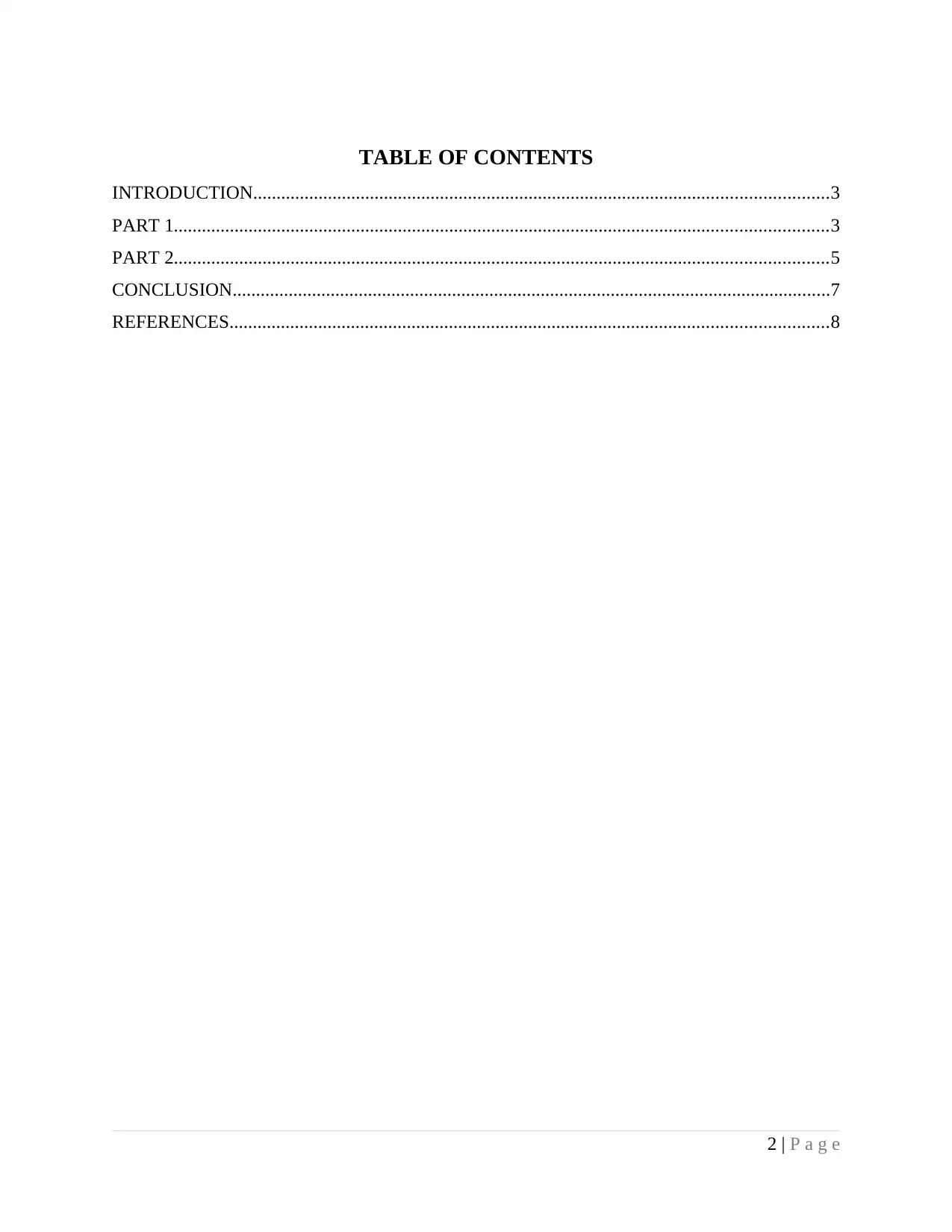
TABLE OF CONTENTS
INTRODUCTION...........................................................................................................................3
PART 1............................................................................................................................................3
PART 2............................................................................................................................................5
CONCLUSION................................................................................................................................7
REFERENCES................................................................................................................................8
2 | P a g e
INTRODUCTION...........................................................................................................................3
PART 1............................................................................................................................................3
PART 2............................................................................................................................................5
CONCLUSION................................................................................................................................7
REFERENCES................................................................................................................................8
2 | P a g e
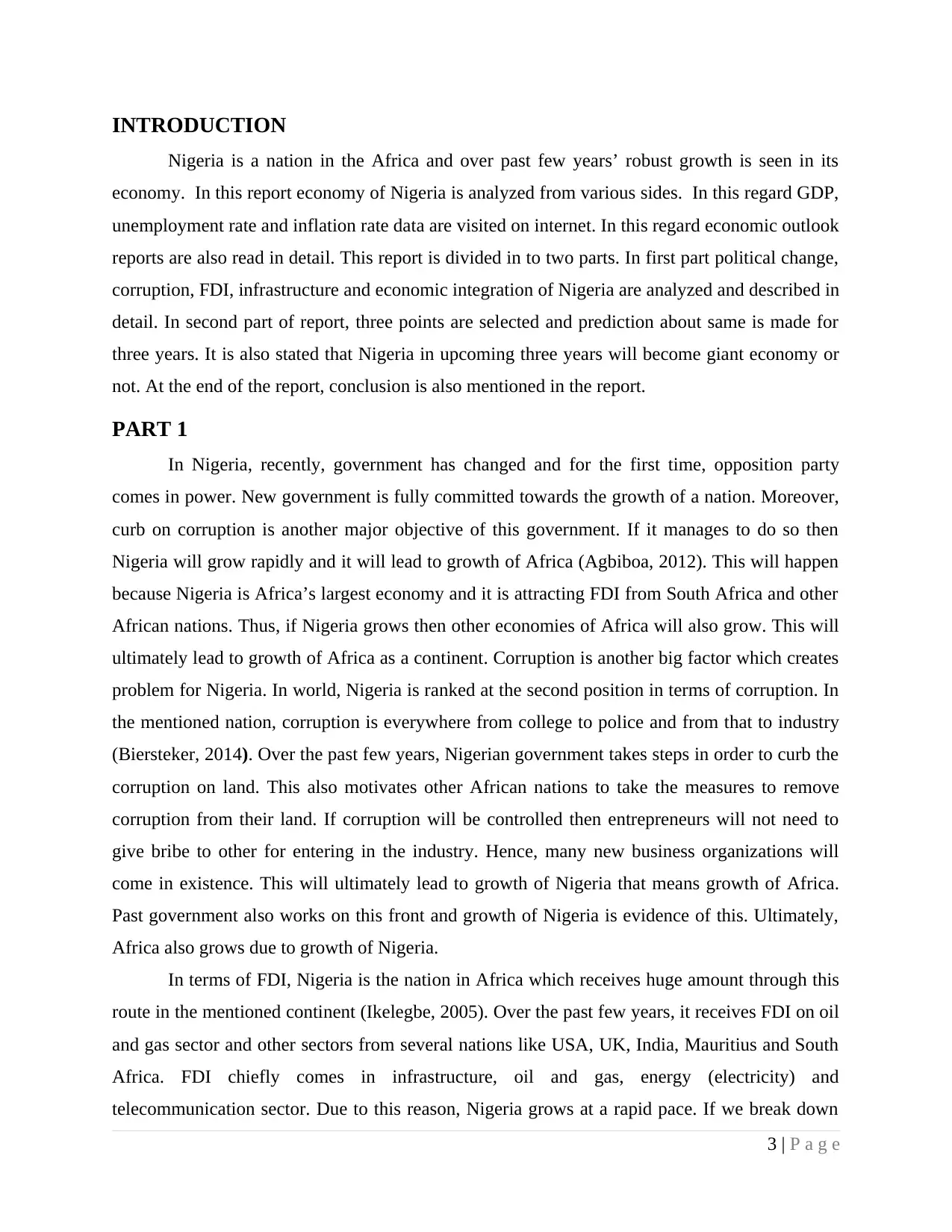
INTRODUCTION
Nigeria is a nation in the Africa and over past few years’ robust growth is seen in its
economy. In this report economy of Nigeria is analyzed from various sides. In this regard GDP,
unemployment rate and inflation rate data are visited on internet. In this regard economic outlook
reports are also read in detail. This report is divided in to two parts. In first part political change,
corruption, FDI, infrastructure and economic integration of Nigeria are analyzed and described in
detail. In second part of report, three points are selected and prediction about same is made for
three years. It is also stated that Nigeria in upcoming three years will become giant economy or
not. At the end of the report, conclusion is also mentioned in the report.
PART 1
In Nigeria, recently, government has changed and for the first time, opposition party
comes in power. New government is fully committed towards the growth of a nation. Moreover,
curb on corruption is another major objective of this government. If it manages to do so then
Nigeria will grow rapidly and it will lead to growth of Africa (Agbiboa, 2012). This will happen
because Nigeria is Africa’s largest economy and it is attracting FDI from South Africa and other
African nations. Thus, if Nigeria grows then other economies of Africa will also grow. This will
ultimately lead to growth of Africa as a continent. Corruption is another big factor which creates
problem for Nigeria. In world, Nigeria is ranked at the second position in terms of corruption. In
the mentioned nation, corruption is everywhere from college to police and from that to industry
(Biersteker, 2014). Over the past few years, Nigerian government takes steps in order to curb the
corruption on land. This also motivates other African nations to take the measures to remove
corruption from their land. If corruption will be controlled then entrepreneurs will not need to
give bribe to other for entering in the industry. Hence, many new business organizations will
come in existence. This will ultimately lead to growth of Nigeria that means growth of Africa.
Past government also works on this front and growth of Nigeria is evidence of this. Ultimately,
Africa also grows due to growth of Nigeria.
In terms of FDI, Nigeria is the nation in Africa which receives huge amount through this
route in the mentioned continent (Ikelegbe, 2005). Over the past few years, it receives FDI on oil
and gas sector and other sectors from several nations like USA, UK, India, Mauritius and South
Africa. FDI chiefly comes in infrastructure, oil and gas, energy (electricity) and
telecommunication sector. Due to this reason, Nigeria grows at a rapid pace. If we break down
3 | P a g e
Nigeria is a nation in the Africa and over past few years’ robust growth is seen in its
economy. In this report economy of Nigeria is analyzed from various sides. In this regard GDP,
unemployment rate and inflation rate data are visited on internet. In this regard economic outlook
reports are also read in detail. This report is divided in to two parts. In first part political change,
corruption, FDI, infrastructure and economic integration of Nigeria are analyzed and described in
detail. In second part of report, three points are selected and prediction about same is made for
three years. It is also stated that Nigeria in upcoming three years will become giant economy or
not. At the end of the report, conclusion is also mentioned in the report.
PART 1
In Nigeria, recently, government has changed and for the first time, opposition party
comes in power. New government is fully committed towards the growth of a nation. Moreover,
curb on corruption is another major objective of this government. If it manages to do so then
Nigeria will grow rapidly and it will lead to growth of Africa (Agbiboa, 2012). This will happen
because Nigeria is Africa’s largest economy and it is attracting FDI from South Africa and other
African nations. Thus, if Nigeria grows then other economies of Africa will also grow. This will
ultimately lead to growth of Africa as a continent. Corruption is another big factor which creates
problem for Nigeria. In world, Nigeria is ranked at the second position in terms of corruption. In
the mentioned nation, corruption is everywhere from college to police and from that to industry
(Biersteker, 2014). Over the past few years, Nigerian government takes steps in order to curb the
corruption on land. This also motivates other African nations to take the measures to remove
corruption from their land. If corruption will be controlled then entrepreneurs will not need to
give bribe to other for entering in the industry. Hence, many new business organizations will
come in existence. This will ultimately lead to growth of Nigeria that means growth of Africa.
Past government also works on this front and growth of Nigeria is evidence of this. Ultimately,
Africa also grows due to growth of Nigeria.
In terms of FDI, Nigeria is the nation in Africa which receives huge amount through this
route in the mentioned continent (Ikelegbe, 2005). Over the past few years, it receives FDI on oil
and gas sector and other sectors from several nations like USA, UK, India, Mauritius and South
Africa. FDI chiefly comes in infrastructure, oil and gas, energy (electricity) and
telecommunication sector. Due to this reason, Nigeria grows at a rapid pace. If we break down
3 | P a g e
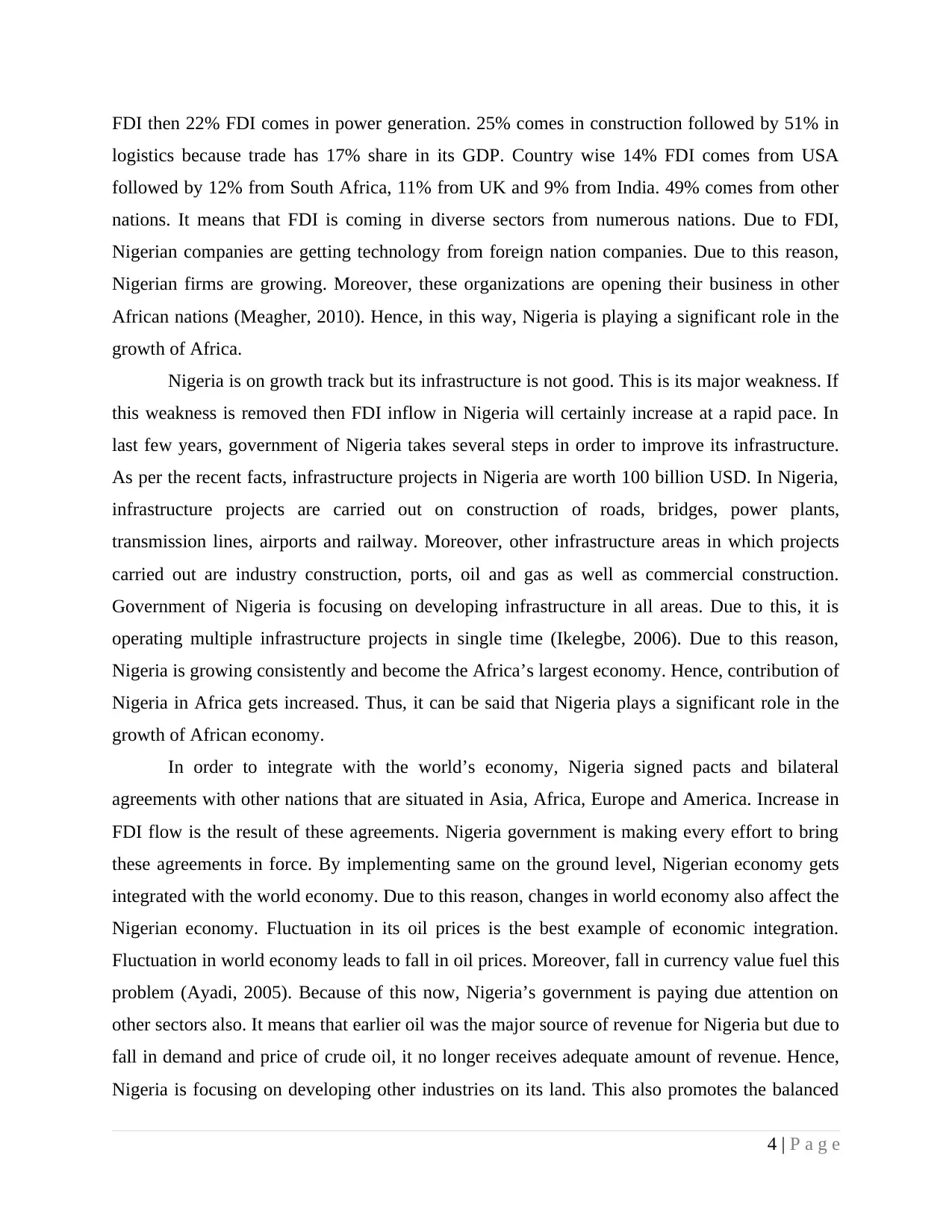
FDI then 22% FDI comes in power generation. 25% comes in construction followed by 51% in
logistics because trade has 17% share in its GDP. Country wise 14% FDI comes from USA
followed by 12% from South Africa, 11% from UK and 9% from India. 49% comes from other
nations. It means that FDI is coming in diverse sectors from numerous nations. Due to FDI,
Nigerian companies are getting technology from foreign nation companies. Due to this reason,
Nigerian firms are growing. Moreover, these organizations are opening their business in other
African nations (Meagher, 2010). Hence, in this way, Nigeria is playing a significant role in the
growth of Africa.
Nigeria is on growth track but its infrastructure is not good. This is its major weakness. If
this weakness is removed then FDI inflow in Nigeria will certainly increase at a rapid pace. In
last few years, government of Nigeria takes several steps in order to improve its infrastructure.
As per the recent facts, infrastructure projects in Nigeria are worth 100 billion USD. In Nigeria,
infrastructure projects are carried out on construction of roads, bridges, power plants,
transmission lines, airports and railway. Moreover, other infrastructure areas in which projects
carried out are industry construction, ports, oil and gas as well as commercial construction.
Government of Nigeria is focusing on developing infrastructure in all areas. Due to this, it is
operating multiple infrastructure projects in single time (Ikelegbe, 2006). Due to this reason,
Nigeria is growing consistently and become the Africa’s largest economy. Hence, contribution of
Nigeria in Africa gets increased. Thus, it can be said that Nigeria plays a significant role in the
growth of African economy.
In order to integrate with the world’s economy, Nigeria signed pacts and bilateral
agreements with other nations that are situated in Asia, Africa, Europe and America. Increase in
FDI flow is the result of these agreements. Nigeria government is making every effort to bring
these agreements in force. By implementing same on the ground level, Nigerian economy gets
integrated with the world economy. Due to this reason, changes in world economy also affect the
Nigerian economy. Fluctuation in its oil prices is the best example of economic integration.
Fluctuation in world economy leads to fall in oil prices. Moreover, fall in currency value fuel this
problem (Ayadi, 2005). Because of this now, Nigeria’s government is paying due attention on
other sectors also. It means that earlier oil was the major source of revenue for Nigeria but due to
fall in demand and price of crude oil, it no longer receives adequate amount of revenue. Hence,
Nigeria is focusing on developing other industries on its land. This also promotes the balanced
4 | P a g e
logistics because trade has 17% share in its GDP. Country wise 14% FDI comes from USA
followed by 12% from South Africa, 11% from UK and 9% from India. 49% comes from other
nations. It means that FDI is coming in diverse sectors from numerous nations. Due to FDI,
Nigerian companies are getting technology from foreign nation companies. Due to this reason,
Nigerian firms are growing. Moreover, these organizations are opening their business in other
African nations (Meagher, 2010). Hence, in this way, Nigeria is playing a significant role in the
growth of Africa.
Nigeria is on growth track but its infrastructure is not good. This is its major weakness. If
this weakness is removed then FDI inflow in Nigeria will certainly increase at a rapid pace. In
last few years, government of Nigeria takes several steps in order to improve its infrastructure.
As per the recent facts, infrastructure projects in Nigeria are worth 100 billion USD. In Nigeria,
infrastructure projects are carried out on construction of roads, bridges, power plants,
transmission lines, airports and railway. Moreover, other infrastructure areas in which projects
carried out are industry construction, ports, oil and gas as well as commercial construction.
Government of Nigeria is focusing on developing infrastructure in all areas. Due to this, it is
operating multiple infrastructure projects in single time (Ikelegbe, 2006). Due to this reason,
Nigeria is growing consistently and become the Africa’s largest economy. Hence, contribution of
Nigeria in Africa gets increased. Thus, it can be said that Nigeria plays a significant role in the
growth of African economy.
In order to integrate with the world’s economy, Nigeria signed pacts and bilateral
agreements with other nations that are situated in Asia, Africa, Europe and America. Increase in
FDI flow is the result of these agreements. Nigeria government is making every effort to bring
these agreements in force. By implementing same on the ground level, Nigerian economy gets
integrated with the world economy. Due to this reason, changes in world economy also affect the
Nigerian economy. Fluctuation in its oil prices is the best example of economic integration.
Fluctuation in world economy leads to fall in oil prices. Moreover, fall in currency value fuel this
problem (Ayadi, 2005). Because of this now, Nigeria’s government is paying due attention on
other sectors also. It means that earlier oil was the major source of revenue for Nigeria but due to
fall in demand and price of crude oil, it no longer receives adequate amount of revenue. Hence,
Nigeria is focusing on developing other industries on its land. This also promotes the balanced
4 | P a g e
Secure Best Marks with AI Grader
Need help grading? Try our AI Grader for instant feedback on your assignments.
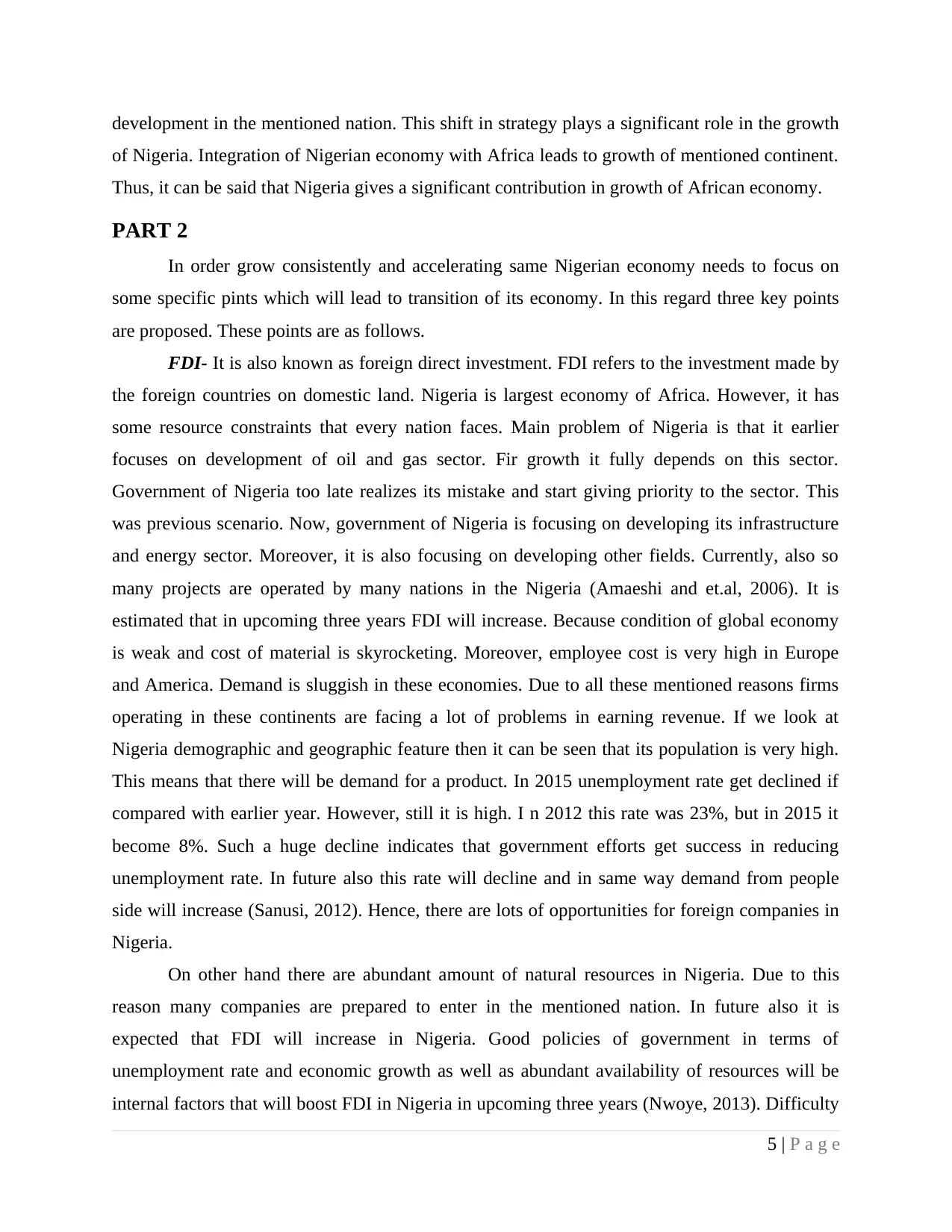
development in the mentioned nation. This shift in strategy plays a significant role in the growth
of Nigeria. Integration of Nigerian economy with Africa leads to growth of mentioned continent.
Thus, it can be said that Nigeria gives a significant contribution in growth of African economy.
PART 2
In order grow consistently and accelerating same Nigerian economy needs to focus on
some specific pints which will lead to transition of its economy. In this regard three key points
are proposed. These points are as follows.
FDI- It is also known as foreign direct investment. FDI refers to the investment made by
the foreign countries on domestic land. Nigeria is largest economy of Africa. However, it has
some resource constraints that every nation faces. Main problem of Nigeria is that it earlier
focuses on development of oil and gas sector. Fir growth it fully depends on this sector.
Government of Nigeria too late realizes its mistake and start giving priority to the sector. This
was previous scenario. Now, government of Nigeria is focusing on developing its infrastructure
and energy sector. Moreover, it is also focusing on developing other fields. Currently, also so
many projects are operated by many nations in the Nigeria (Amaeshi and et.al, 2006). It is
estimated that in upcoming three years FDI will increase. Because condition of global economy
is weak and cost of material is skyrocketing. Moreover, employee cost is very high in Europe
and America. Demand is sluggish in these economies. Due to all these mentioned reasons firms
operating in these continents are facing a lot of problems in earning revenue. If we look at
Nigeria demographic and geographic feature then it can be seen that its population is very high.
This means that there will be demand for a product. In 2015 unemployment rate get declined if
compared with earlier year. However, still it is high. I n 2012 this rate was 23%, but in 2015 it
become 8%. Such a huge decline indicates that government efforts get success in reducing
unemployment rate. In future also this rate will decline and in same way demand from people
side will increase (Sanusi, 2012). Hence, there are lots of opportunities for foreign companies in
Nigeria.
On other hand there are abundant amount of natural resources in Nigeria. Due to this
reason many companies are prepared to enter in the mentioned nation. In future also it is
expected that FDI will increase in Nigeria. Good policies of government in terms of
unemployment rate and economic growth as well as abundant availability of resources will be
internal factors that will boost FDI in Nigeria in upcoming three years (Nwoye, 2013). Difficulty
5 | P a g e
of Nigeria. Integration of Nigerian economy with Africa leads to growth of mentioned continent.
Thus, it can be said that Nigeria gives a significant contribution in growth of African economy.
PART 2
In order grow consistently and accelerating same Nigerian economy needs to focus on
some specific pints which will lead to transition of its economy. In this regard three key points
are proposed. These points are as follows.
FDI- It is also known as foreign direct investment. FDI refers to the investment made by
the foreign countries on domestic land. Nigeria is largest economy of Africa. However, it has
some resource constraints that every nation faces. Main problem of Nigeria is that it earlier
focuses on development of oil and gas sector. Fir growth it fully depends on this sector.
Government of Nigeria too late realizes its mistake and start giving priority to the sector. This
was previous scenario. Now, government of Nigeria is focusing on developing its infrastructure
and energy sector. Moreover, it is also focusing on developing other fields. Currently, also so
many projects are operated by many nations in the Nigeria (Amaeshi and et.al, 2006). It is
estimated that in upcoming three years FDI will increase. Because condition of global economy
is weak and cost of material is skyrocketing. Moreover, employee cost is very high in Europe
and America. Demand is sluggish in these economies. Due to all these mentioned reasons firms
operating in these continents are facing a lot of problems in earning revenue. If we look at
Nigeria demographic and geographic feature then it can be seen that its population is very high.
This means that there will be demand for a product. In 2015 unemployment rate get declined if
compared with earlier year. However, still it is high. I n 2012 this rate was 23%, but in 2015 it
become 8%. Such a huge decline indicates that government efforts get success in reducing
unemployment rate. In future also this rate will decline and in same way demand from people
side will increase (Sanusi, 2012). Hence, there are lots of opportunities for foreign companies in
Nigeria.
On other hand there are abundant amount of natural resources in Nigeria. Due to this
reason many companies are prepared to enter in the mentioned nation. In future also it is
expected that FDI will increase in Nigeria. Good policies of government in terms of
unemployment rate and economic growth as well as abundant availability of resources will be
internal factors that will boost FDI in Nigeria in upcoming three years (Nwoye, 2013). Difficulty
5 | P a g e
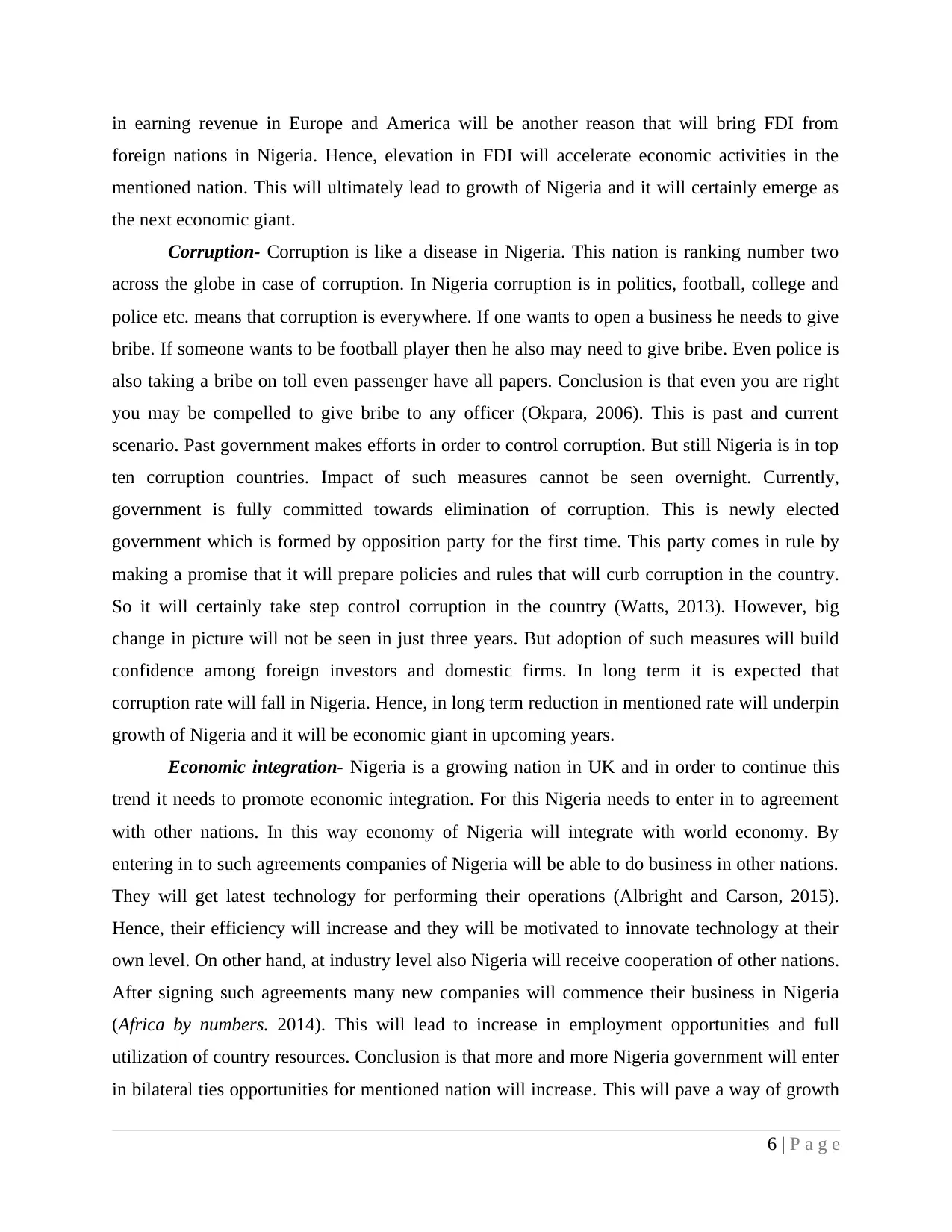
in earning revenue in Europe and America will be another reason that will bring FDI from
foreign nations in Nigeria. Hence, elevation in FDI will accelerate economic activities in the
mentioned nation. This will ultimately lead to growth of Nigeria and it will certainly emerge as
the next economic giant.
Corruption- Corruption is like a disease in Nigeria. This nation is ranking number two
across the globe in case of corruption. In Nigeria corruption is in politics, football, college and
police etc. means that corruption is everywhere. If one wants to open a business he needs to give
bribe. If someone wants to be football player then he also may need to give bribe. Even police is
also taking a bribe on toll even passenger have all papers. Conclusion is that even you are right
you may be compelled to give bribe to any officer (Okpara, 2006). This is past and current
scenario. Past government makes efforts in order to control corruption. But still Nigeria is in top
ten corruption countries. Impact of such measures cannot be seen overnight. Currently,
government is fully committed towards elimination of corruption. This is newly elected
government which is formed by opposition party for the first time. This party comes in rule by
making a promise that it will prepare policies and rules that will curb corruption in the country.
So it will certainly take step control corruption in the country (Watts, 2013). However, big
change in picture will not be seen in just three years. But adoption of such measures will build
confidence among foreign investors and domestic firms. In long term it is expected that
corruption rate will fall in Nigeria. Hence, in long term reduction in mentioned rate will underpin
growth of Nigeria and it will be economic giant in upcoming years.
Economic integration- Nigeria is a growing nation in UK and in order to continue this
trend it needs to promote economic integration. For this Nigeria needs to enter in to agreement
with other nations. In this way economy of Nigeria will integrate with world economy. By
entering in to such agreements companies of Nigeria will be able to do business in other nations.
They will get latest technology for performing their operations (Albright and Carson, 2015).
Hence, their efficiency will increase and they will be motivated to innovate technology at their
own level. On other hand, at industry level also Nigeria will receive cooperation of other nations.
After signing such agreements many new companies will commence their business in Nigeria
(Africa by numbers. 2014). This will lead to increase in employment opportunities and full
utilization of country resources. Conclusion is that more and more Nigeria government will enter
in bilateral ties opportunities for mentioned nation will increase. This will pave a way of growth
6 | P a g e
foreign nations in Nigeria. Hence, elevation in FDI will accelerate economic activities in the
mentioned nation. This will ultimately lead to growth of Nigeria and it will certainly emerge as
the next economic giant.
Corruption- Corruption is like a disease in Nigeria. This nation is ranking number two
across the globe in case of corruption. In Nigeria corruption is in politics, football, college and
police etc. means that corruption is everywhere. If one wants to open a business he needs to give
bribe. If someone wants to be football player then he also may need to give bribe. Even police is
also taking a bribe on toll even passenger have all papers. Conclusion is that even you are right
you may be compelled to give bribe to any officer (Okpara, 2006). This is past and current
scenario. Past government makes efforts in order to control corruption. But still Nigeria is in top
ten corruption countries. Impact of such measures cannot be seen overnight. Currently,
government is fully committed towards elimination of corruption. This is newly elected
government which is formed by opposition party for the first time. This party comes in rule by
making a promise that it will prepare policies and rules that will curb corruption in the country.
So it will certainly take step control corruption in the country (Watts, 2013). However, big
change in picture will not be seen in just three years. But adoption of such measures will build
confidence among foreign investors and domestic firms. In long term it is expected that
corruption rate will fall in Nigeria. Hence, in long term reduction in mentioned rate will underpin
growth of Nigeria and it will be economic giant in upcoming years.
Economic integration- Nigeria is a growing nation in UK and in order to continue this
trend it needs to promote economic integration. For this Nigeria needs to enter in to agreement
with other nations. In this way economy of Nigeria will integrate with world economy. By
entering in to such agreements companies of Nigeria will be able to do business in other nations.
They will get latest technology for performing their operations (Albright and Carson, 2015).
Hence, their efficiency will increase and they will be motivated to innovate technology at their
own level. On other hand, at industry level also Nigeria will receive cooperation of other nations.
After signing such agreements many new companies will commence their business in Nigeria
(Africa by numbers. 2014). This will lead to increase in employment opportunities and full
utilization of country resources. Conclusion is that more and more Nigeria government will enter
in bilateral ties opportunities for mentioned nation will increase. This will pave a way of growth
6 | P a g e
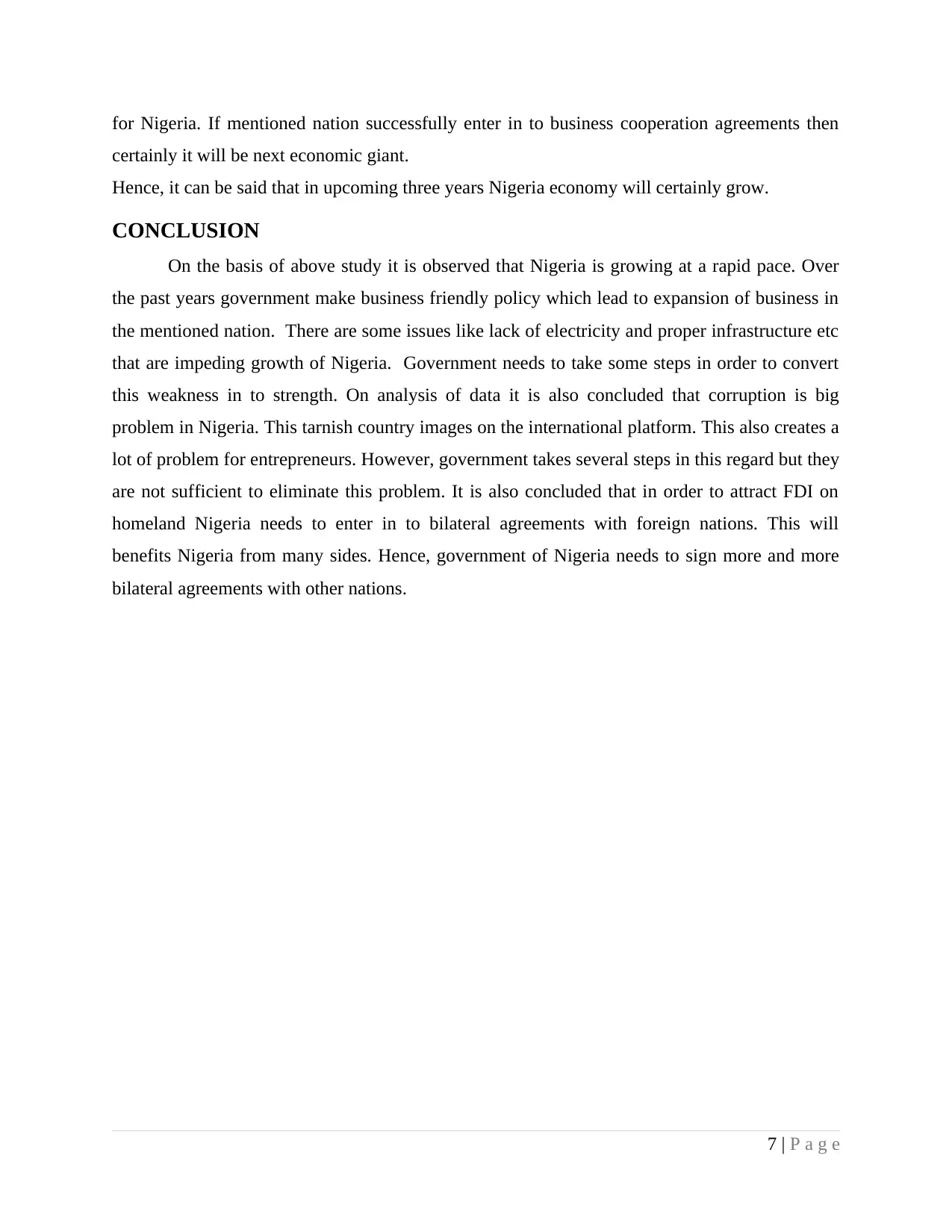
for Nigeria. If mentioned nation successfully enter in to business cooperation agreements then
certainly it will be next economic giant.
Hence, it can be said that in upcoming three years Nigeria economy will certainly grow.
CONCLUSION
On the basis of above study it is observed that Nigeria is growing at a rapid pace. Over
the past years government make business friendly policy which lead to expansion of business in
the mentioned nation. There are some issues like lack of electricity and proper infrastructure etc
that are impeding growth of Nigeria. Government needs to take some steps in order to convert
this weakness in to strength. On analysis of data it is also concluded that corruption is big
problem in Nigeria. This tarnish country images on the international platform. This also creates a
lot of problem for entrepreneurs. However, government takes several steps in this regard but they
are not sufficient to eliminate this problem. It is also concluded that in order to attract FDI on
homeland Nigeria needs to enter in to bilateral agreements with foreign nations. This will
benefits Nigeria from many sides. Hence, government of Nigeria needs to sign more and more
bilateral agreements with other nations.
7 | P a g e
certainly it will be next economic giant.
Hence, it can be said that in upcoming three years Nigeria economy will certainly grow.
CONCLUSION
On the basis of above study it is observed that Nigeria is growing at a rapid pace. Over
the past years government make business friendly policy which lead to expansion of business in
the mentioned nation. There are some issues like lack of electricity and proper infrastructure etc
that are impeding growth of Nigeria. Government needs to take some steps in order to convert
this weakness in to strength. On analysis of data it is also concluded that corruption is big
problem in Nigeria. This tarnish country images on the international platform. This also creates a
lot of problem for entrepreneurs. However, government takes several steps in this regard but they
are not sufficient to eliminate this problem. It is also concluded that in order to attract FDI on
homeland Nigeria needs to enter in to bilateral agreements with foreign nations. This will
benefits Nigeria from many sides. Hence, government of Nigeria needs to sign more and more
bilateral agreements with other nations.
7 | P a g e
Paraphrase This Document
Need a fresh take? Get an instant paraphrase of this document with our AI Paraphraser
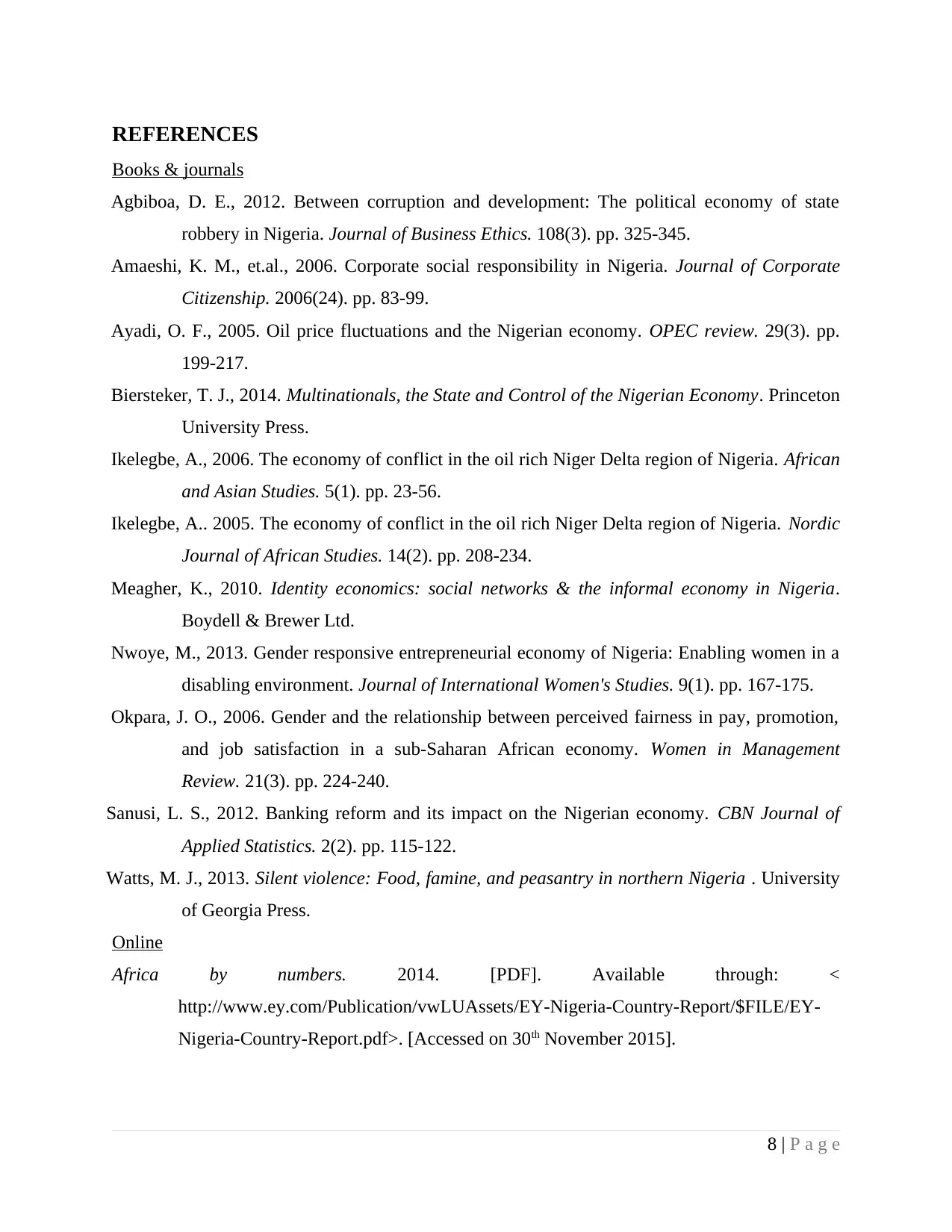
REFERENCES
Books & journals
Agbiboa, D. E., 2012. Between corruption and development: The political economy of state
robbery in Nigeria. Journal of Business Ethics. 108(3). pp. 325-345.
Amaeshi, K. M., et.al., 2006. Corporate social responsibility in Nigeria. Journal of Corporate
Citizenship. 2006(24). pp. 83-99.
Ayadi, O. F., 2005. Oil price fluctuations and the Nigerian economy. OPEC review. 29(3). pp.
199-217.
Biersteker, T. J., 2014. Multinationals, the State and Control of the Nigerian Economy. Princeton
University Press.
Ikelegbe, A., 2006. The economy of conflict in the oil rich Niger Delta region of Nigeria. African
and Asian Studies. 5(1). pp. 23-56.
Ikelegbe, A.. 2005. The economy of conflict in the oil rich Niger Delta region of Nigeria. Nordic
Journal of African Studies. 14(2). pp. 208-234.
Meagher, K., 2010. Identity economics: social networks & the informal economy in Nigeria.
Boydell & Brewer Ltd.
Nwoye, M., 2013. Gender responsive entrepreneurial economy of Nigeria: Enabling women in a
disabling environment. Journal of International Women's Studies. 9(1). pp. 167-175.
Okpara, J. O., 2006. Gender and the relationship between perceived fairness in pay, promotion,
and job satisfaction in a sub-Saharan African economy. Women in Management
Review. 21(3). pp. 224-240.
Sanusi, L. S., 2012. Banking reform and its impact on the Nigerian economy. CBN Journal of
Applied Statistics. 2(2). pp. 115-122.
Watts, M. J., 2013. Silent violence: Food, famine, and peasantry in northern Nigeria . University
of Georgia Press.
Online
Africa by numbers. 2014. [PDF]. Available through: <
http://www.ey.com/Publication/vwLUAssets/EY-Nigeria-Country-Report/$FILE/EY-
Nigeria-Country-Report.pdf>. [Accessed on 30th November 2015].
8 | P a g e
Books & journals
Agbiboa, D. E., 2012. Between corruption and development: The political economy of state
robbery in Nigeria. Journal of Business Ethics. 108(3). pp. 325-345.
Amaeshi, K. M., et.al., 2006. Corporate social responsibility in Nigeria. Journal of Corporate
Citizenship. 2006(24). pp. 83-99.
Ayadi, O. F., 2005. Oil price fluctuations and the Nigerian economy. OPEC review. 29(3). pp.
199-217.
Biersteker, T. J., 2014. Multinationals, the State and Control of the Nigerian Economy. Princeton
University Press.
Ikelegbe, A., 2006. The economy of conflict in the oil rich Niger Delta region of Nigeria. African
and Asian Studies. 5(1). pp. 23-56.
Ikelegbe, A.. 2005. The economy of conflict in the oil rich Niger Delta region of Nigeria. Nordic
Journal of African Studies. 14(2). pp. 208-234.
Meagher, K., 2010. Identity economics: social networks & the informal economy in Nigeria.
Boydell & Brewer Ltd.
Nwoye, M., 2013. Gender responsive entrepreneurial economy of Nigeria: Enabling women in a
disabling environment. Journal of International Women's Studies. 9(1). pp. 167-175.
Okpara, J. O., 2006. Gender and the relationship between perceived fairness in pay, promotion,
and job satisfaction in a sub-Saharan African economy. Women in Management
Review. 21(3). pp. 224-240.
Sanusi, L. S., 2012. Banking reform and its impact on the Nigerian economy. CBN Journal of
Applied Statistics. 2(2). pp. 115-122.
Watts, M. J., 2013. Silent violence: Food, famine, and peasantry in northern Nigeria . University
of Georgia Press.
Online
Africa by numbers. 2014. [PDF]. Available through: <
http://www.ey.com/Publication/vwLUAssets/EY-Nigeria-Country-Report/$FILE/EY-
Nigeria-Country-Report.pdf>. [Accessed on 30th November 2015].
8 | P a g e
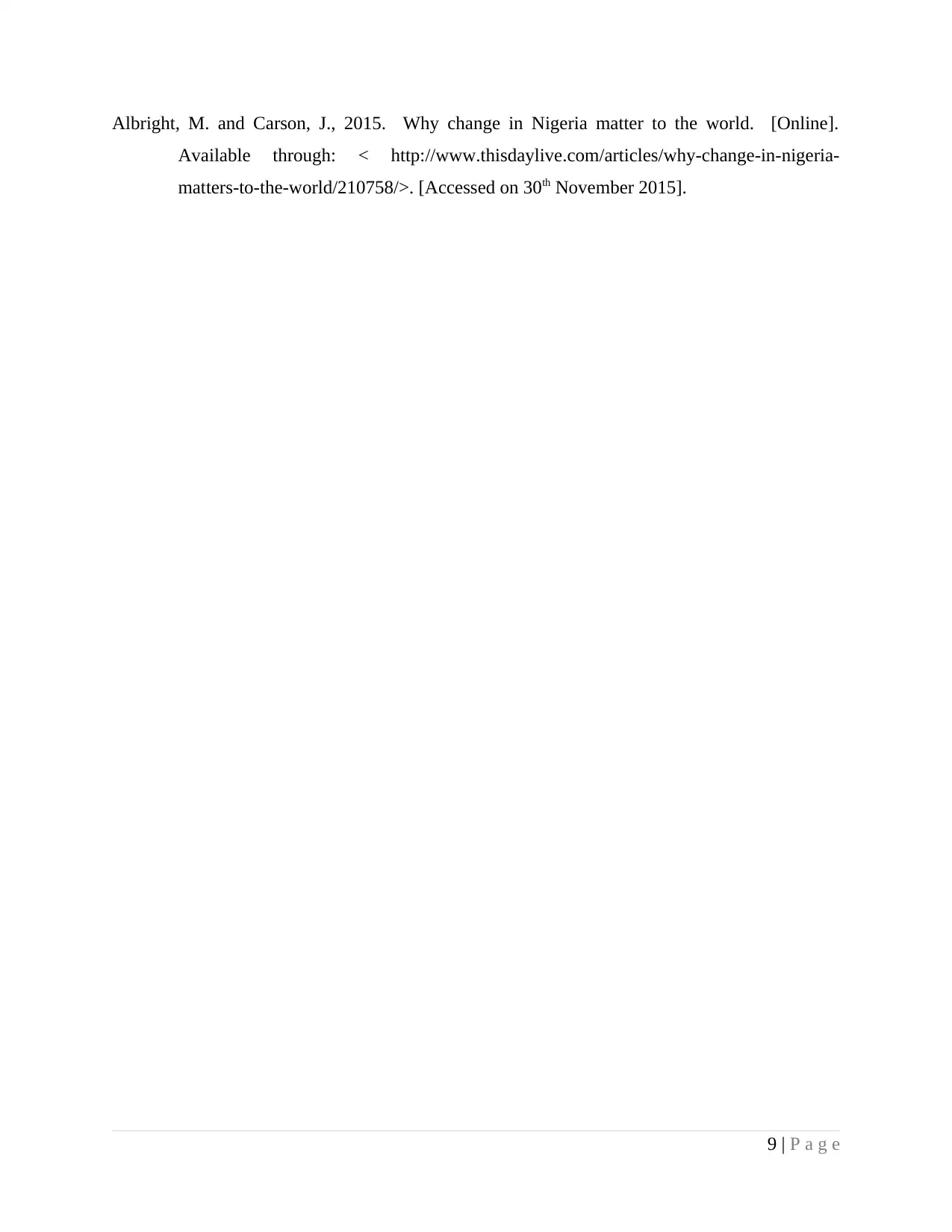
Albright, M. and Carson, J., 2015. Why change in Nigeria matter to the world. [Online].
Available through: < http://www.thisdaylive.com/articles/why-change-in-nigeria-
matters-to-the-world/210758/>. [Accessed on 30th November 2015].
9 | P a g e
Available through: < http://www.thisdaylive.com/articles/why-change-in-nigeria-
matters-to-the-world/210758/>. [Accessed on 30th November 2015].
9 | P a g e
1 out of 9
Related Documents
Your All-in-One AI-Powered Toolkit for Academic Success.
+13062052269
info@desklib.com
Available 24*7 on WhatsApp / Email
![[object Object]](/_next/static/media/star-bottom.7253800d.svg)
Unlock your academic potential
© 2024 | Zucol Services PVT LTD | All rights reserved.





